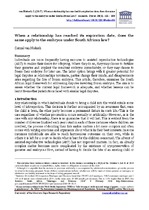| dc.contributor.author | van Niekerk, Carmel | |
| dc.date.accessioned | 2017-08-15T13:36:35Z | |
| dc.date.available | 2017-08-15T13:36:35Z | |
| dc.date.issued | 2017 | |
| dc.identifier.citation | van Niekerk, C. (2017). When a relationship has reached its expiration date, does the same apply to the embryos under South African Law? - research. Obiter, 38(1): 165 - 180 | en_US |
| dc.identifier.issn | 1682-5853 | |
| dc.identifier.uri | http://hdl.handle.net/10566/3125 | |
| dc.identifier.uri | http://hdl.handle.net/10520/EJC-89e6bcc86 | |
| dc.description.abstract | Individuals are more frequently having recourse to assisted reproductive technologies (ART) to realize their desire for offspring. Where they do so, they may choose to fertilize their gametes and implant the resultant embryos immediately, or they may choose to freeze their embryos for later use. The latter option brings with it greater potential for legal disputes as relationships terminate, parties change their minds, and disagreements arise regarding the fate of frozen embryos. This article, therefore, examines the South African legal framework for addressing disputes involving frozen embryos. The aim is to assess whether the current legal framework is adequate, and whether lessons can be learnt from other jurisdictions faced with similar legal disputes. | |
| dc.language.iso | en | en_US |
| dc.publisher | Nelson Mandela Metropolitan University | en_US |
| dc.rights | This is the author-version of the article published online at: http://hdl.handle.net/10520/EJC-89e6bcc86 | |
| dc.subject | Assisted reproductive technologies (ART) | en_US |
| dc.subject | Embreyo | en_US |
| dc.subject | Freezing | en_US |
| dc.subject | South Africa | en_US |
| dc.title | When a relationship has reached its expiration date, does the same apply to the embryos under South African Law? - research | en_US |
| dc.type | Article | en_US |
| dc.privacy.showsubmitter | FALSE | |
| dc.status.ispeerreviewed | TRUE | |
| dc.description.accreditation | DHET | |

